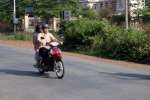- Text size
 |
|  |
|  |
| 
- Français
Statelessness: Breaking the cycle in Kyrgyzstan
News Stories, 26 August 2011
OSH, Kyrgyzstan, August 26 (UNHCR) – Ravshan and his wife Feruza work in the fields from dawn to dusk, slaving 14 hours every day under the hot sun with few breaks to eat or rest. Their children and grandchildren toil beside them, planting crops like maize, potatoes and tomatoes. They can only dream of having their own plot of the land and formal jobs with shorter working hours and better pay.
But three generations of this family have no rights because on paper, they do not exist. The couple, three of their children and six of their grandchildren are stateless.
This is despite the fact that Ravshan, aged 59, and Feruza, 57, were born and have been living their whole life in Kashgar-Kyshtak village, some 15 kilometres from the southern Kyrgyz city of Osh. They still hold old red Soviet passports, documents of the country that broke up two decades ago. They became stateless because they did not apply for new citizenship papers after Kyrgyzstan became independent in 1991.
According to surveys conducted by the UN refugee agency, over 17,000 people in Kyrgyzstan are currently stateless or at risk of becoming stateless. Most of them have lived here for many years, have close family links in the country and are culturally and socially well-integrated. But because they lack citizenship documents, they are often unable to register a marriage or the birth of a child, to travel within Kyrgyzstan and overseas, to receive pensions or social allowances, or to own property.
The majority of stateless people in the Kyrgyz Republic are women or minors. Their lack of citizenship documents increases their vulnerability, including for exploitation and abuse in their families and communities.
For Ravshan and Feruza, being stateless means that they cannot receive their old age pension even though they have both worked in a local collective farm for more than 20 years. Feruza says her biggest fear is to fall sick. Access to basic health care is limited for non-citizens and the family cannot afford to pay the high costs of hospital care.
Their children face even greater problems due to their stateless status. Their son Shovkat, 34, also had a Soviet passport but lost it years ago. "I earn 100 som (about US$2,5) per day," he said. "I have to pay a fine for the lost passport and other fees to restore documents, in total about 3,000 som (about US$ 70). To get a new Kyrgyz passport I need to go to the town several times, pay for transport, and miss several days of work. I don't have so much money and I don't know what to do with papers."
His wife has a Kyrgyz passport but because Shovkat is stateless, their two daughters, aged one and four, have no birth certificates and will be stateless in the future as well. The family receives no social allowances for children as they are not officially registered. The girls are too young to understand what it means to be stateless but they are getting used to the extreme poverty and having no opportunities for education or a better future.
Shovkat works illegally in the market in the neighbouring village of Kara Suu. He cannot work in the fields like his family as he lost part of his arm when he was working as a mechanic in a private garage. The lack of personal documents and valid passport makes it impossible for him to get a monthly disability allowance.
His brother, 37, also holds a Soviet passport. He says that with no valid ID he cannot go beyond his village. "I would like to go to work in Russia to support my family and parents, like many Kyrgyz nationals do," he said. "But without valid documents I cannot even visit my relatives in Osh or Bishkek."
Mubarak Sadykova is a local activist who helps a UNHCR non-governmental partner to find and help stateless people. "In this small community alone, I identified about 40 stateless people who face difficulties similar to Ravshan and his family's," she said.
Globally, UNHCR has been given a mandate to work with governments to prevent statelessness from occurring, to resolve those cases that do occur and to protect the rights of stateless persons. In Kyrgyzstan, the agency has been funding civil society organisations, providing advice on legislation and practices, and giving technical support to authorities tasked with solving citizenship problems.
Part of this work involves funding joint governmental-NGO mobile clinics to reach out to stateless individuals and help them become Kyrgyz nationals. UNHCR pays for vehicles, fuel and equipment that enable lawyers from the local NGO to help Ravshan and hundreds of other families submit papers in order to exchange old Soviet passports for new Kyrgyz ones.
Since independence, Kyrgyzstan has taken many positive steps to reduce and prevent statelessness. Of the 20,000 refugees who arrived in Kyrgyzstan after fleeing the civil war in Tajikistan in the 1990s, around 10,000 were granted Kyrgyz citizenship while the rest repatriated. Thousands of people have exchanged their old Soviet passports for new Kyrgyz ones and become Kyrgyz nationals. But more stateless people emerge as UNHCR conducts outreach activities jointly with the authorities and NGOs.
In 2009 UNHCR and the government of Kyrgyzstan jointly adopted a National Plan for the Reduction and Prevention of Statelessness. In June this year, the agency and its partners from civil society and the government met to discuss the progress made and to revise the national plan. They agreed to conduct a comprehensive survey on the current scale and situation of stateless people and to take steps to ensure that all new-born children on the territory of the Kyrgyz Republic are provided with birth certificates. They also agreed to initiate accession of the Kyrgyz Republic to the 1954 Convention Relating to the Status of Stateless Persons and the 1961 Convention on the Reduction of Statelessness.
To mark the 50th anniversary of the 1961 Convention this year, UNHCR has launched a campaign (add hyperlink) encouraging states to sign up as parties to the two Conventions on statelessness. In December, the agency will hold a ministerial-level meeting in Geneva to promote international efforts towards resolving the problem of statelessness.
* Names have been changed for protection reasons.
By Natalia Prokopchuk in Osh, Kyrgyzstan





































